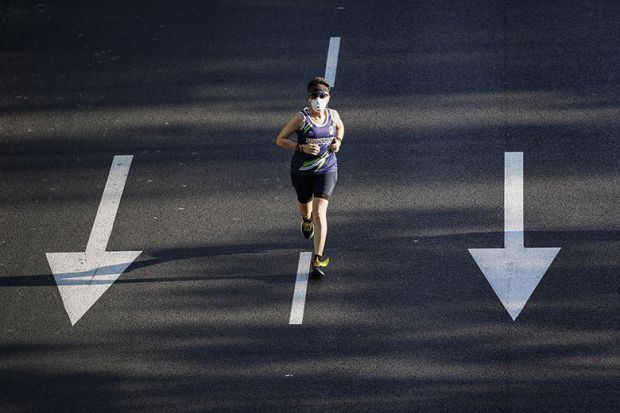The sense that the pandemic is acting as an accelerator, sending us skidding further and faster down roads we were already on, seems itself to be speeding up.
Take, for example, the social unrest over inequality and, in particular, racial injustice, which has led the news in recent weeks. Speaking in a recent Times Higher Education webinar, part of our #THEinConversation series, Leslie M. Harris, professor of history and African American studies at Northwestern University, said it was no surprise that Covid-19 and the explosion of anger about racism and police brutality had happened at the same time, “because the pandemic also is so racialised”. In our opinion pages, we hear two more takes on the Black Lives Matter movement, and how universities can help societies to effect real change – and the barriers that might yet prevent them from doing so.
Take, as another example, the dramatic escalation of political tensions between China and Western powers, heightened further by the passing of a new national security law in Hong Kong last week – a power play facilitated, perhaps, by the pandemic’s domination of political bandwidth elsewhere.
In higher education, there are plenty of examples, too.
These include the realignment of online teaching and learning as a much more significant element of how universities engage their students – a topic that will be discussed next week at a major conference organised by Arizona State University, for which THE is a partner (to register for free, search for “Remote: the connected faculty summit”).
We are also seeing a vengeful return of many of the sticks that have been used to beat higher education in recent years, again supersized by the circumstances.
Last week, for example, the higher education minister accused English universities of having “taken advantage” of many students, whom they had enrolled in “dumbed down” courses. Too much focus, she said, was on getting students through the door, not enough on how many go on to graduate jobs.
The attack on value is not new, but this was a fierce intervention and it sets the tone early in Michelle Donelan’s tenure.
The risk that politicians will use the economic crisis precipitated by the pandemic to revive the “more means worse” trope, and to curtail certain areas of study, is evident in Australia as well.
Indeed, a hugely significant reform package unveiled in recent weeks (the details of which are explored in our news pages) was even titled “Job Ready Graduates”, and proposes to cut tuition fees for favoured subjects such as agriculture and mathematics by as much as two-thirds while more than doubling fees for humanities degrees. That, as they say, escalated quickly.
One of the other effects of Covid-19 has been to significantly increase the spotlight on research. For obvious reasons, this has focused on science that has the potential to release us from pandemic purgatory, but like any area of research the fields under the spotlight are complex and fallible.
So we have seen issues that science has long had to contend with opened up to far greater scrutiny – an example being the high-profile retraction of a number of studies, including work on the safety and efficacy of the anti-malarial drug hydroxychloroquine as a treatment for Covid-19.
Will such missteps undermine faith in science in the long term? It is hard to say, but this period of public scrutiny will inevitably revive debates about peer review, research fraud and reproducibility that have long bubbled beneath the surface, away from public view.
Perhaps that will encourage some acceleration of that debate within science itself. In our features pages, we hear from a scholar and self-styled fraud detective on why he devotes his time to sniffing out dodgy data – and why he wishes more academics would engage in a fraught and often thankless quest. Or at least more actively support those who do.
“Science faces assaults from those who oppose it for ideological reasons, and some colleagues are afraid that exposing wrongdoing by researchers is strengthening the enemies of science,” writes David A. Sanders, an associate professor in biological sciences at Purdue University.
This, he argues, is plain wrong-headed. “Science must clean its own house, and those who help should be commended, not condemned.”

